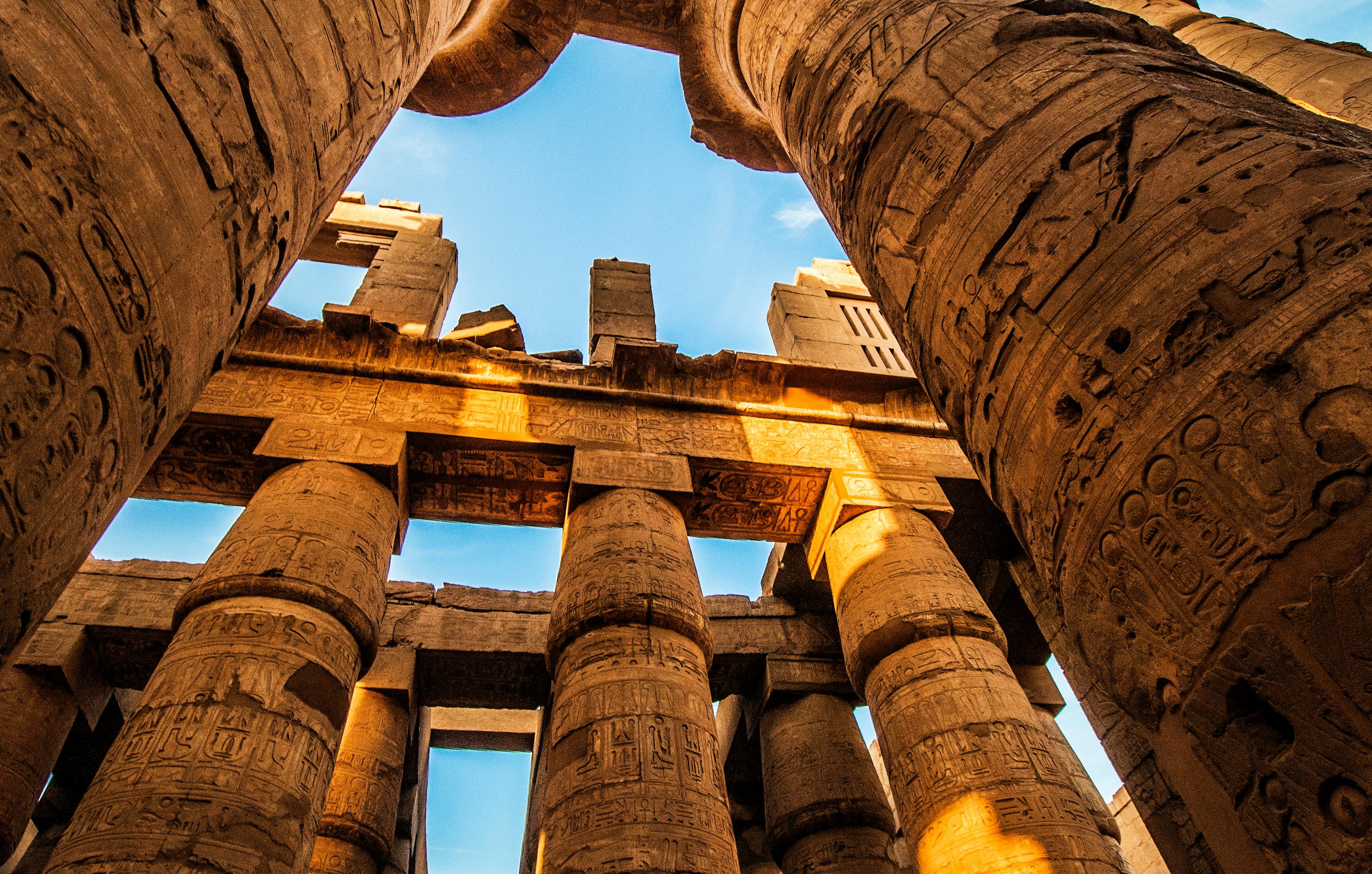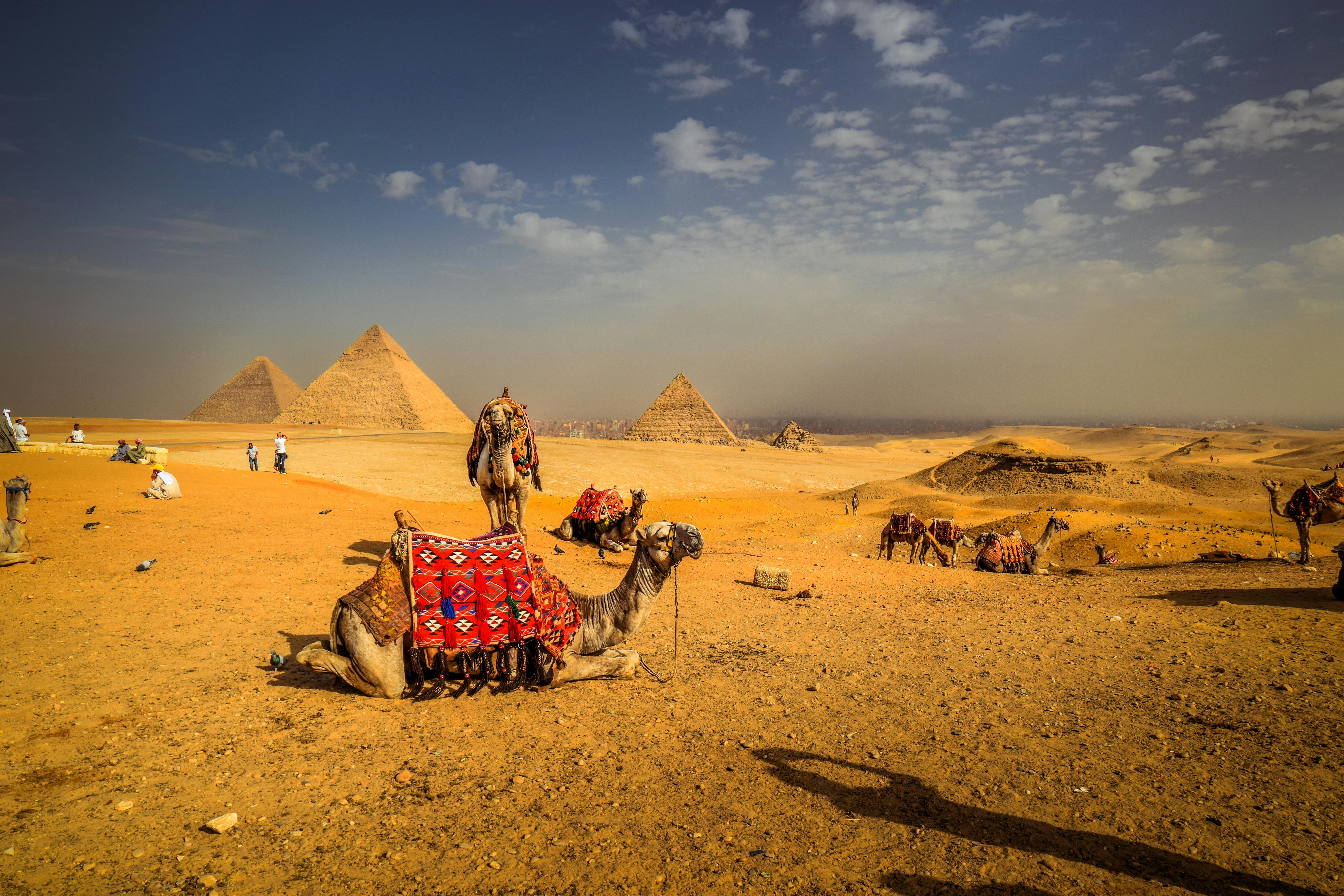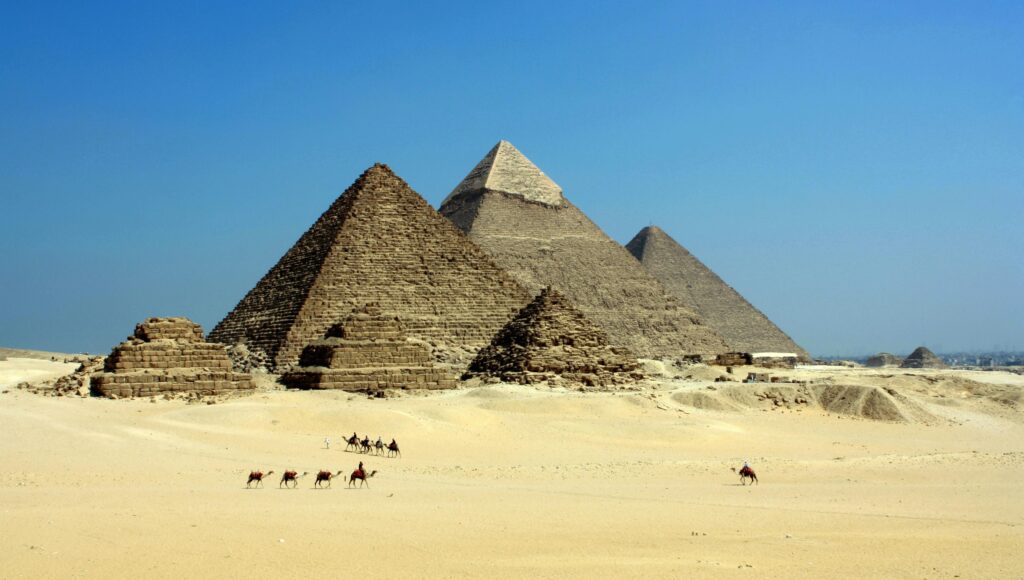As I stepped off the plane in Cairo, the warm Egyptian sun on my skin and the cacophony of horns and chatter in my ears, I knew this was going to be an adventure like no other. With a backpack full of dreams and a pocket full of pennies, I set out to explore the land of the pharaohs, determined to experience all that Egypt had to offer without breaking the bank.
From the frenetic, pulsating streets of Cairo to the tranquil waters of the Nile, Egypt represents a country steeped in history, mystery, and beauty. As a poor backpacker determined to see it all without sacrificing any of my values or budget, I found that with some creativity, a lot of curiosity, and a willingness to travel down the road less traversed, I discovered a new side of Egypt that few ever get to see.
In this blog, I will be taking you through the highs and lows of broke backpacking in Egypt. From haggling with vendors in the markets of Luxor to camping under the stars in the desert, I’ll share my tips, tricks, and stories of adventure and misadventure. So come along with me, and discover the secrets of Egypt on a budget!
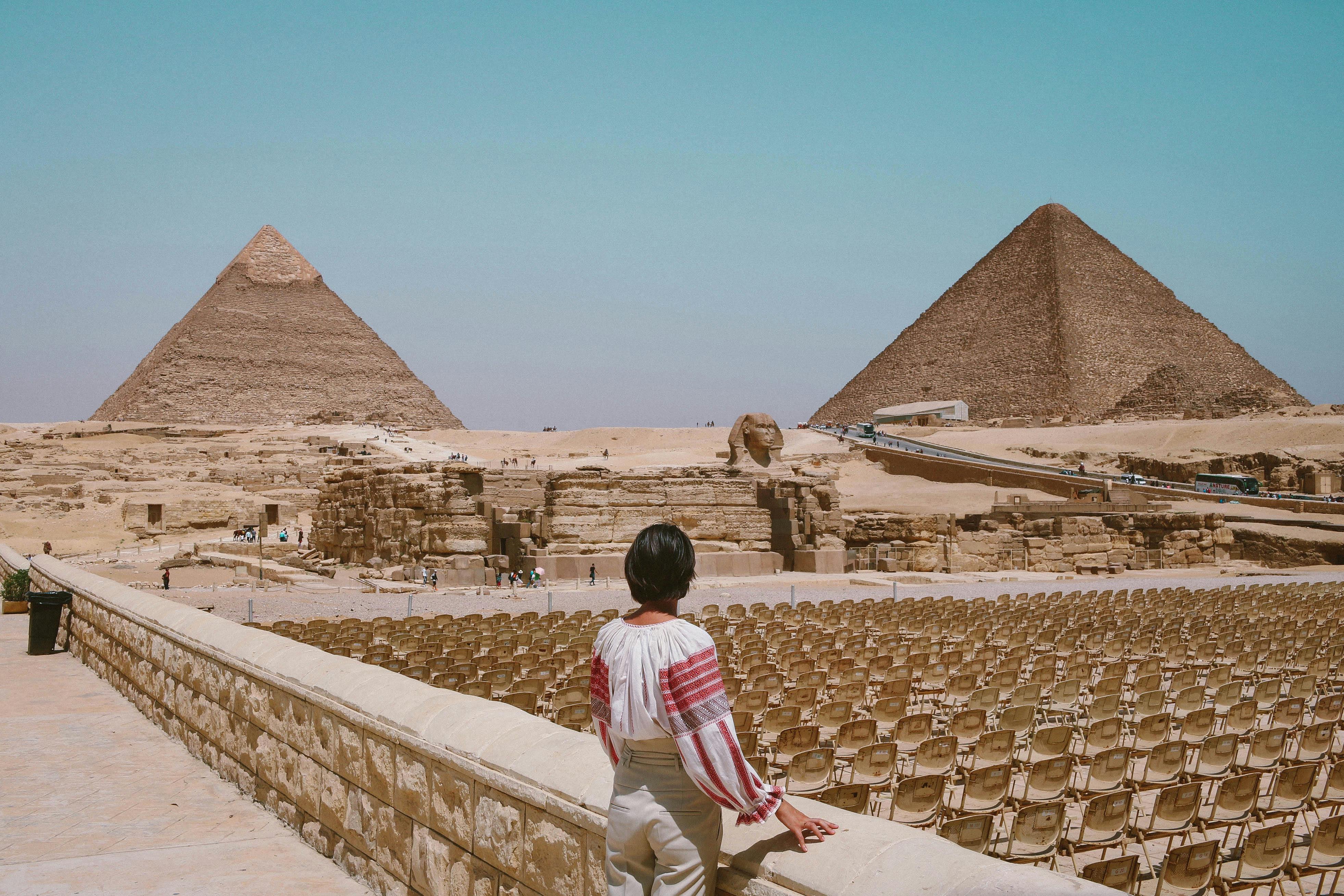
How to get there:
While flying might seem like the most convenient option, taking public transportation from neighboring countries can be a cost-effective and adventurous way to get to Egypt. In this post, we’ll explore the different options for traveling to Egypt by public transportation from its neighboring countries.
From Israel
- Bus and Ferry: Take a bus from Tel Aviv or Jerusalem to the Israeli port city of Eilat. From Eilat, take a ferry to the Jordanian port city of Aqaba. From Aqaba, take a bus or taxi to the Egyptian border crossing at Taba. The journey takes around 10-12 hours and costs approximately $30-$50.
- Direct Bus: There are also direct bus services from Tel Aviv to Cairo operated by companies like Egged and Mazada Tours. The journey takes around 24 hours and costs approximately $50-$70.
From Jordan
- Bus and Taxi: Take a bus from Amman to the Jordanian port city of Aqaba. From Aqaba, take a taxi to the Egyptian border crossing at Taba. The journey takes around 6-8 hours and costs approximately $20-$30.
- Direct Bus: There are also direct bus services from Amman to Cairo operated by companies like JETT and Mazada Tours. The journey takes around 18-20 hours and costs approximately $40-$60.
From Libya
- Direct Bus: There are direct bus services from Tripoli to Cairo operated by companies like Al Saad and Al Watan. The journey takes around 24-30 hours and costs approximately $50-$70.
- Note: Traveling from Libya to Egypt can be unpredictable due to the current security situation in Libya. It’s essential to check the latest travel advisories and plan carefully before embarking on your journey.
From Sudan
- Direct Bus: There are direct bus services from Khartoum to Cairo operated by companies like Al Saad and Al Watan. The journey takes around 24-30 hours and costs approximately $50-$70.
- Ferry and Bus: Another option is to take a ferry from Khartoum to the Egyptian city of Aswan. From Aswan, take a bus to Cairo. The journey takes around 30-36 hours and costs approximately $60-$80.
When to go:
As a broke backpacker, timing is everything when it comes to planning your trip to Egypt. The country’s climate, tourist season, and cultural events can all impact your travel experience. In this post, we’ll break down the different times to visit Egypt, including the best times for budget-conscious travelers.
Weather and Climate
Egypt’s climate is generally hot and dry, with very little rainfall. The best time to visit Egypt in terms of weather is from October to February, when the temperatures are mild and pleasant. However, this is also the peak tourist season, which means higher prices for accommodations and tourist services.
- Summer (June to August): This is the hottest time of the year in Egypt, with temperatures often reaching 40°C (104°F). While it’s not the most comfortable time to visit, it’s also the low season, which means you can find cheaper accommodations and tour packages.
- Winter (December to February): This is the coolest time of the year in Egypt, with temperatures ranging from 10°C to 20°C (50°F to 68°F). It’s a great time to visit the pyramids and other outdoor attractions without the heat.
- Spring (March to May) and Autumn (September to November): These seasons offer pleasant weather, with mild temperatures and minimal rainfall. They’re great times to visit Egypt if you want to avoid the crowds and high prices of the peak season.
Tourist Season
Egypt’s tourist season typically runs from December to February, with the peak season being around Christmas and New Year’s. During this time, prices for accommodations, tour packages, and tourist services tend to be higher.
- Peak Season (December to February): Expect large crowds and higher prices for tourist services.
- Shoulder Season (March to May and September to November): Prices for tourist services tend to be lower, and the crowds are smaller.
- Low Season (June to August): This is the cheapest time to visit Egypt, but be prepared for the heat and potential disruptions to tourist services.
Cultural Events and Holidays
Egypt has a rich cultural calendar, with many festivals and holidays throughout the year. Some of these events can be a great way to experience Egyptian culture, while others may impact your travel plans.
- Sham el-Nessim (March): A spring festival that marks the beginning of spring.
- Ramadan (dates vary): A holy month of fasting for Muslims, which can impact tourist services and opening hours.
- Eid al-Fitr (dates vary): A festival that marks the end of Ramadan, which can be a great time to experience Egyptian culture.
- Coptic Christmas (January 7th): A celebration of Christmas by the Coptic Christian community in Egypt.
Best Time to Visit for Broke Backpackers
Based on the factors mentioned above, the best time to visit Egypt as a broke backpacker is during the shoulder season (March to May and September to November). The weather is pleasant, the crowds are smaller, and the prices for tourist services tend to be lower.
However, if you’re looking for the cheapest option and don’t mind the heat, visiting during the low season (June to August) can be a good option.
Best Itineraries:
3-Day Itinerary
Day 1: Cairo
- Explore Islamic Cairo and Khan el-Khalili market
- Visit the Egyptian Museum (entry fee: 120 LE / $7.50 USD)
Day 2: Cairo
- Visit the Pyramids of Giza (entry fee: 150 LE / $9.50 USD)
- Explore the Solar Boat Museum (entry fee: 100 LE / $6.25 USD)
Day 3: Cairo to Alexandria
- Take an overnight bus to Alexandria (approx. 4 hours, 100 LE / $6.25 USD)
- Explore the Citadel of Qaitbay and the Bibliotheca Alexandrina
1-Week Itinerary
Day 1-2: Cairo
- Explore Islamic Cairo and Khan el-Khalili market
- Visit the Egyptian Museum and the Pyramids of Giza
Day 3-4: Alexandria
- Explore the Citadel of Qaitbay and the Bibliotheca Alexandrina
- Visit the Catacombs of Kom el Shoqafa and the Temple of Taposiris Magna
Day 5-6: Luxor
- Take an overnight bus to Luxor (approx. 10 hours, 200 LE / $12.50 USD)
- Explore the Temple of Karnak and the Valley of the Kings
Day 7: Luxor to Cairo
- Take an overnight bus back to Cairo (approx. 10 hours, 200 LE / $12.50 USD)
2-Week Itinerary
Day 1-3: Cairo
- Explore Islamic Cairo and Khan el-Khalili market
- Visit the Egyptian Museum and the Pyramids of Giza
- Take a day trip to Saqqara and Dahshur
Day 4-6: Alexandria
- Explore the Citadel of Qaitbay and the Bibliotheca Alexandrina
- Visit the Catacombs of Kom el Shoqafa and the Temple of Taposiris Magna
- Take a day trip to the ancient city of Abu Sir
Day 7-9: Luxor
- Take an overnight bus to Luxor (approx. 10 hours, 200 LE / $12.50 USD)
- Explore the Temple of Karnak and the Valley of the Kings
- Take a day trip to the Temple of Hatshepsut and the Colossi of Memnon
Day 10-14: Aswan and Abu Simbel
- Take an overnight bus to Aswan (approx. 4 hours, 100 LE / $6.25 USD)
- Explore the Temple of Isis and the Unfinished Obelisk
- Take a day trip to Abu Simbel (approx. 3 hours, 50 LE / $3.12 USD)
1-Month Itinerary
Week 1: Cairo and Alexandria
- Explore Islamic Cairo and Khan el-Khalili market
- Visit the Egyptian Museum and the Pyramids of Giza
- Take a day trip to Saqqara and Dahshur
- Explore the Citadel of Qaitbay and the Bibliotheca Alexandrina
Week 2: Luxor and Aswan
- Take an overnight bus to Luxor (approx. 10 hours, 200 LE / $12.50 USD)
- Explore the Temple of Karnak and the Valley of the Kings
- Take a day trip to the Temple of Hatshepsut and the Colossi of Memnon
- Take an overnight bus to Aswan (approx. 4 hours, 100 LE / $6.25 USD)
- Explore the Temple of Isis and the Unfinished Obelisk
Week 3: Abu Simbel and the Western Desert
- Take a day trip to Abu Simbel (approx. 3 hours, 50 LE / $3.12 USD)
- Explore the Western Desert and the oases of Bahariya and Siwa
Week 4: Cairo and the Nile Delta
- Return to Cairo and explore the city’s markets and museums
- Take a day trip to the Nile Delta and the ancient city of Tanis
3-Month Itinerary
Month 1: Cairo, Alexandria, and the Nile Delta
- Explore Islamic Cairo and Khan el-Khalili market
- Visit the Egyptian Museum and the Pyramids of Giza
- Take a day trip to Saqqara and Dahshur
- Explore the Citadel of Qaitbay and the Bibliotheca Alexandrina
- Take a day trip to the Nile Delta and the ancient city of Tanis
Month 2: Luxor, Aswan, and Abu Simbel
- Take an overnight bus to Luxor (approx. 10 hours, 200 LE / $12.50 USD)
- Explore the Temple of Karnak and the Valley of the Kings
- Take a day trip to the Temple of Hatshepsut and the Colossi of Memnon
- Take an overnight bus to Aswan (approx. 4 hours, 100 LE / $6.25 USD)
- Explore the Temple of Isis and the Unfinished Obelisk
- Take a day trip to Abu Simbel (approx. 3 hours, 50 LE / $3.12 USD)
Month 3: Western Desert, Sinai, and the Red Sea
- Explore the Western Desert and the oases of Bahariya and Siwa
- Take an overnight bus to Sinai (approx. 8 hours, 150 LE / $9.37 USD)
- Explore the Sinai Peninsula and the city of Saint Catherine
- Take an overnight bus to the Red Sea coast (approx. 4 hours, 100 LE / $6.25 USD)
- Relax on the beaches of Hurghada or Marsa Alam
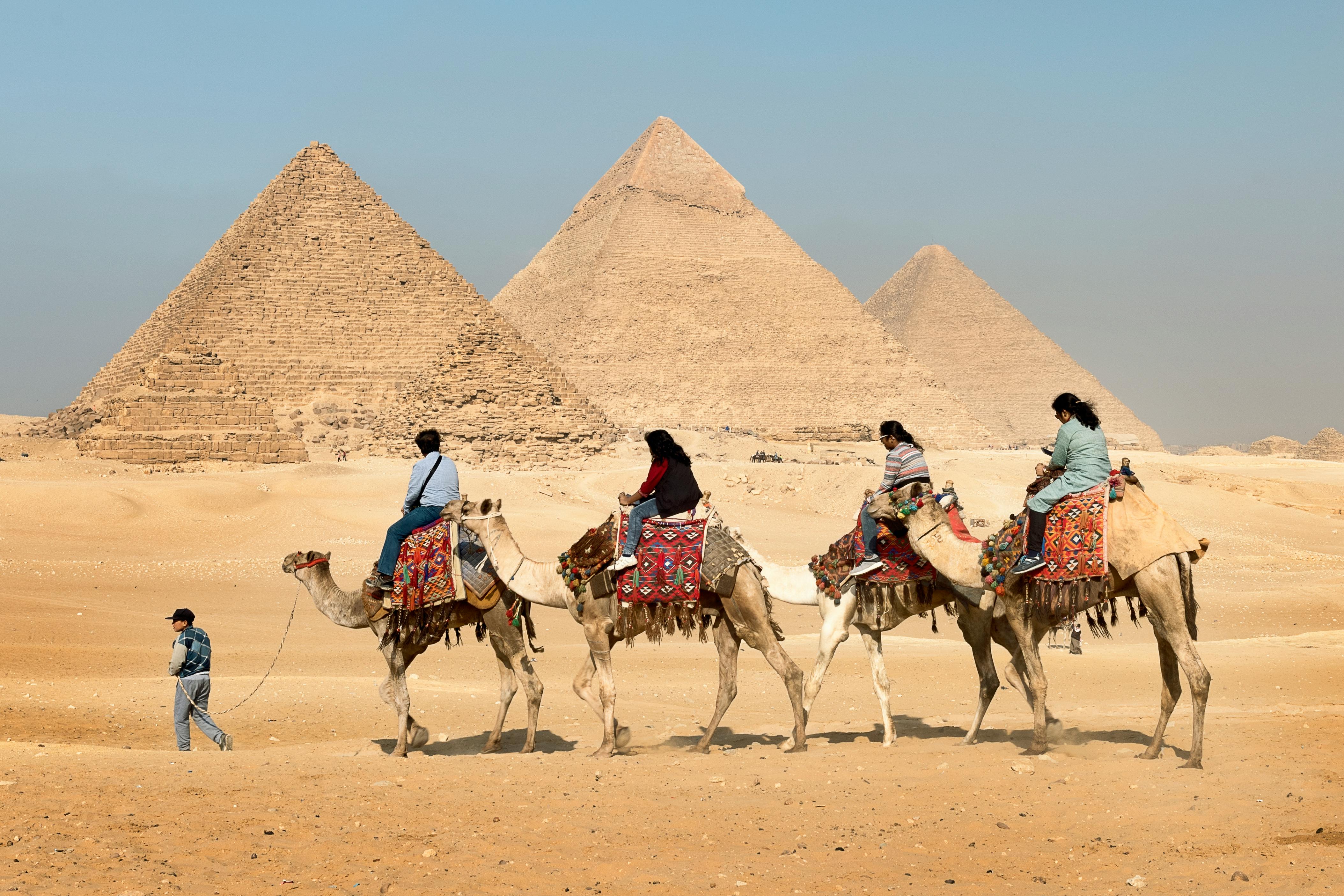
Transportation:
Egypt has a well-developed public transportation system that connects major cities and towns. As a broke backpacker, using public transportation is an affordable and authentic way to experience Egypt. In this comprehensive guide, we’ll cover everything you need to know about public transportation in Egypt.
Types of Public Transportation in Egypt
- Buses: Egypt has an extensive network of buses that connect major cities and towns. Bus companies like Go Bus, Blue Bus, and Upper Egypt Bus Company operate on various routes.
- Microbuses: Microbuses are smaller, 14-seater buses that operate on shorter routes, often connecting smaller towns and villages.
- Taxis: Taxis are widely available in Egyptian cities, but be prepared to haggle over prices.
- Uber and Careem: Ride-hailing services like Uber and Careem operate in major Egyptian cities like Cairo and Alexandria.
- Trains: Egypt has a railway network that connects major cities like Cairo, Alexandria, and Luxor.
- Ferries: Ferries operate on the Nile River, connecting cities like Cairo, Luxor, and Aswan.
How to Use Public Transportation in Egypt
- Bus Stations: Bus stations in Egypt are usually chaotic, but most stations have a ticket office where you can buy tickets.
- Microbus Stations: Microbus stations are often smaller and less organized than bus stations.
- Taxis: When taking a taxi, agree on the price before you start your journey.
- Trains: Train tickets can be bought at train stations or online.
- Ferries: Ferry tickets can be bought at the ferry terminal or online.
Tips for Using Public Transportation in Egypt
- Learn Some Arabic: Learning some basic Arabic phrases can help you navigate public transportation in Egypt.
- Be Prepared for Crowds: Public transportation in Egypt can be very crowded, especially during peak hours.
- Haggle Over Prices: When taking a taxi or microbus, be prepared to haggle over prices.
- Respect Local Customs: When using public transportation in Egypt, be respectful of local customs and traditions.
Safety and Security
- Traffic: Egyptian roads can be chaotic, so be careful when crossing the road or taking a taxi.
- Pickpocketing: Be mindful of your belongings, especially in crowded buses and trains.
- Scams: Be cautious of scams, especially when dealing with taxi drivers or microbus operators.
Top things to do:
Cairo
- Pyramids of Giza: No trip to Egypt is complete without visiting the Pyramids of Giza. (Entry fee: 150 LE / $9.50 USD)
- Egyptian Museum: The Egyptian Museum is home to the world’s largest collection of ancient Egyptian artifacts. (Entry fee: 120 LE / $7.50 USD)
- Islamic Cairo: Explore the narrow streets and bustling markets of Islamic Cairo. (Free)
- Khan el-Khalili Market: This ancient market is a great place to try local food and buy souvenirs. (Free)
- Muhammad Ali Mosque: This beautiful mosque is one of the largest in Egypt. (Free)
Alexandria
- Citadel of Qaitbay: This 15th-century fortress is a great place to learn about Alexandria’s history. (Entry fee: 50 LE / $3.12 USD)
- Bibliotheca Alexandrina: This modern library is a great place to learn about Alexandria’s rich cultural heritage. (Entry fee: 70 LE / $4.37 USD)
- Catacombs of Kom el Shoqafa: These ancient catacombs are a great place to learn about Alexandria’s ancient history. (Entry fee: 50 LE / $3.12 USD)
- Temple of Taposiris Magna: This ancient temple is a great place to learn about Alexandria’s ancient history. (Entry fee: 50 LE / $3.12 USD)
- Montazah Palace: This beautiful palace is a great place to relax and enjoy the gardens. (Entry fee: 25 LE / $1.56 USD)
Luxor
- Valley of the Kings: This ancient necropolis is a must-visit for anyone interested in ancient Egyptian history. (Entry fee: 240 LE / $15 USD)
- Temple of Karnak: This ancient temple complex is one of the largest in Egypt. (Entry fee: 150 LE / $9.50 USD)
- Temple of Hatshepsut: This ancient temple is one of the most impressive in Egypt. (Entry fee: 100 LE / $6.25 USD)
- Colossi of Memnon: These two massive stone statues are a great place to learn about ancient Egyptian history. (Entry fee: 50 LE / $3.12 USD)
- Luxor Temple: This ancient temple is a great place to learn about ancient Egyptian history. (Entry fee: 100 LE / $6.25 USD)
Aswan
- Temple of Isis: This ancient temple is a great place to learn about ancient Egyptian history. (Entry fee: 100 LE / $6.25 USD)
- Unfinished Obelisk: This ancient obelisk is a great place to learn about ancient Egyptian history. (Entry fee: 50 LE / $3.12 USD)
- Nubian Museum: This museum is a great place to learn about Nubian culture and history. (Entry fee: 50 LE / $3.12 USD)
- Abu Simbel: These two massive rock-cut temples are a must-visit for anyone interested in ancient Egyptian history. (Entry fee: 240 LE / $15 USD)
- Felucca Ride: Take a relaxing felucca ride along the Nile River. (Cost: 50-100 LE / $3.12-$6.25 USD)
Sinai
- Mount Sinai: This mountain is a great place to hike and enjoy the stunning views. (Free)
- Saint Catherine’s Monastery: This ancient monastery is a great place to learn about Christian history. (Entry fee: 25 LE / $1.56 USD)
- Ras Mohammed National Park: This national park is a great place to snorkel and enjoy the stunning coral reefs. (Entry fee: 50 LE / $3.12 USD)
- Sharm El-Sheikh: This popular resort town is a great place to relax and enjoy the stunning beaches. (Free)
- Dahab: This laid-back town is a great place to relax and enjoy the stunning beaches. (Free)
Western Desert
- Dakhla Oasis: This oasis is a great place
- Bahariya Oasis: This oasis is a great place to relax and enjoy the stunning natural beauty. (Free)
- White Desert: This stunning natural wonder is a great place to hike and enjoy the breathtaking views. (Free)
- Black Desert: This stunning natural wonder is a great place to hike and enjoy the breathtaking views. (Free)
Food:
Egyptian cuisine is a rich and diverse blend of Mediterranean, Middle Eastern, and African flavors, with a focus on fresh vegetables, fruits, and whole grains. As a broke backpacker, you’ll be pleased to know that eating in Egypt can be very affordable, with a wide range of delicious and authentic options available at all price points.
The best thing about Egyptian food is that it’s so full of fresh produce, especially in these traditional dishes: ful medames, or stewed fava beans, ta’ameya- Egyptian falafel, and shawarma is a popular street food made with thinly sliced meat, which is served in a pita with vegetables and tahini sauce. You’ll also find a wide variety of fruits, including mangoes, bananas, and citrus fruits, which often are eaten as a snack or used in juices and smoothies.
Equally famous are the rich sauces that accompany Egyptian cuisine, such as tahini and molokhia, which could accompany rice, bread, and vegetables. Indeed, one of the most popular dishes in Egyptian cuisine is Molokhia, a thick green sauce prepared with leaves of the Molokhia plant; it is usually served over rice or bread. Koshari is another dish made of pasta, lentils, tomato sauce, and fried onions, being a popular vegetarian meal.
As a poor backpacker, you will be relieved to know that eating in Egypt can be very affordable and is available in all price ranges, from super cheap to super expensive. Street food is a great option, with popular dishes like shawarma, falafel, and ful medames available for just a few pounds. Mid-range restaurants offer a good range of options, which include traditional Egyptian dishes, such as molokhia and koshari, to international dishes like pizzas and pasta.
Along with delicious food, Egypt is also renowned for sweet sweets like baklava, basbousa, and kunafah. The pastry sweet dish consists of honey, sugar, and nuts in its content and is served after or even after dinner as a snack. One can find fresh juices and smoothies from mangoes, bananas, and citrus fruits.
When it comes to eating in Egypt, there are a few things to keep in mind. First, be sure to eat at reputable restaurants and food stalls, as food poisoning can be a risk. Second, be prepared for crowds and long lines, especially during peak meal times. Finally, be adventurous and do not be afraid to go out of your comfort zone, as Egyptian cuisine is so diverse and full of flavor that you will surely find something you love.
As for specific dishes to try, the list is endless. For breakfast, try ful medames or ta’ameya, both of which are delicious and filling. For lunch, try shawarma or koshari, both of which are popular street foods that are easy to find. For dinner, try molokhia or mahshi, both traditional Egyptian dishes that are rich and flavorful.
In addition to trying new dishes, be sure to also try some of the local drinks, like ahwa (Egyptian coffee) or karkade (a sweet tea made with hibiscus flowers). Both of these drinks are delicious and refreshing, and are a great way to relax and unwind after a long day of exploring.
Overall, Egypt is a foodie heaven; it has a number of delicious and authentic options available at all price points. As a poor backpacker, you will be pleased to find out that eating in Egypt is quite affordable and can easily be done on a budget to taste the rich and diverse cuisine that Egypt has to offer. But you name it: spicy, sweet, refreshing- Egypt can definitely provide it; so go ahead and be prepared, you need it to please all food tastings!
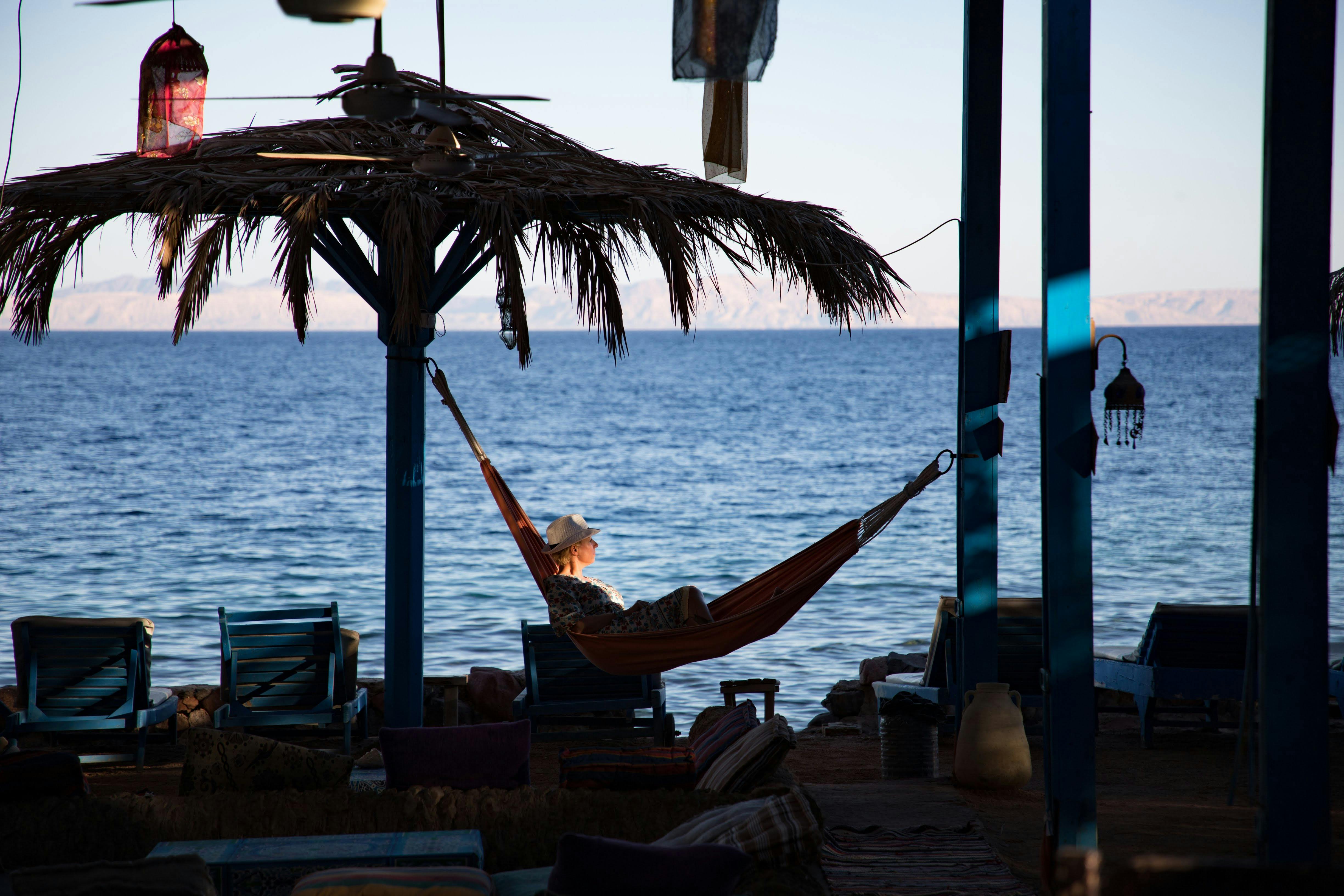
Culture:
Egyptian culture is one of those multi-variant colorful tapestries, interwoven from hundreds of years of tradition and folklore, from the ancient pyramids up to the modern-day streets of Cairo, a blend of the old with the new. It is essentially a culture of hospitality and liberality at its very core. It is a place where a visitor gets a warm welcome with open arms and smiling faces.
The closeness that the Egyptian culture bears to its past is incredible. Egyptians pride in the heritage of their forefathers, and one could confidently count among the nations which hold some impressive, well-preserved monuments that date from very ancient times, like Pyramids of Giza down to temples of Luxor, ancient history serving for great pride and source of inspiration among Egyptian people.
Despite its deep connection to the past, Egyptian culture is also a culture that is very much alive and vibrant. In the streets of Cairo and Alexandria, you can hear the sounds of traditional Arabic music, see the colorful displays of traditional clothing and textiles, and smell the delicious aromas of traditional Egyptian cuisine. From the spicy flavors of koshari and falafel to sweet delicacies like baklava and basbousa, Egyptian food forms an integral part of the culture in the country.
Egyptian culture is also a very warm and hospitable culture. Those who come to Egypt are often struck by the friendly and welcoming nature of the Egyptian people. From the moment you arrive in the country, you are likely to be greeted with a warm smile and a hearty welcome. This hospitality is a key part of Egyptian culture, and it is something that visitors to the country are likely to remember long after they leave.
But, aside from its hospitable people, Egyptian culture also loves celebration and festivity. Most of the time, Egyptians have festivals and holidays, some of which are still linked to the seasons, while others were brought about by the arrival of the Islamic faith; for example, Sham el-Nessim, Eid al-Fitr, and Eid al-Adha. This makes celebration one of the aspects of Egyptian culture, and visitors are sure to get a look at some of the more interesting and rich traditions the country has to offer.
Egyptian culture is a culture that expresses great creativity and artistic expression. From the complex hieroglyphics in ancient Egypt to modern paintings and sculptures by Egyptian artists, the country can boast of a long, rich tradition of artistic innovation and creativity. This creativity can be expressed from the colorful textiles and cloths of traditional Egyptian clothing to the lively and energetic rhythms in traditional Arabic music.
Besides its many strong points and attractions, Egyptian culture also has its share of difficulties and complications. Like many nations in the Middle East, Egypt has faced quite a few significant challenges over the recent years, from economic instability and political unrest to the ongoing struggles of modernization and development. These have indeed posed a challenge to Egyptian culture and forced many Egyptians to reassess their values and traditions in the face of rapid change and uncertainty.
Despite these challenges, however, Egyptian culture remains a vibrant and resilient force that continues to inspire and captivate visitors from around the world. From the Pyramids and temples of ancient times to the bustling cities and towns of today, Egypt is a country steeped in history and tradition, yet alive with the energy and creativity of its people. Be you historian, artist, or simply a curious traveler, there is something for everyone in Egypt, and the culture will be sure to leave a lasting impression on all who come.
The Egyptian people are very hospitable and warm. In Egypt, visitors are often received with a broad smile and a warm welcome, making them feel at home in this ancient and vibrant land. This is part of Egyptian culture, and it is something that visitors to the country are likely to remember long after they leave.
Along with the hospitality, the richness of traditions and colorfulness of Egyptian culture has a special place among them. From the bright fabrics and garments that constitute the attire to the traditional Arabic music that was usually full of life, rhythm, and energy, Egypt is a traditionally soaked country. Visitors to Egypt can experience these traditions firsthand by attending a traditional Egyptian wedding, watching a performance of traditional Arabic music or dance, or simply by walking through the streets of Cairo or Alexandria and taking in the sights and sounds of this vibrant and ancient land.
Egyptian culture is also a culture of great creativity and artistic expression. From the detailed hieroglyphics among the ancient Egyptians to the more modern-day paintings and sculptures produced by Egyptian artists, the country truly has a long tradition for innovation and creativity in the arts. Creativeness is found in everything from multicolored textiles and clothes that were representative of traditional Egyptian attire to the dynamic liveliness of traditional Arabic music and its rhythms.
Despite its many strengths and attractions, Egyptian culture is not without its challenges and complexities. Like many countries in the Middle East, Egypt has faced a number of significant challenges in recent years, from economic instability and political unrest to the ongoing struggles of modernization and development. These challenges have affected Egyptian culture greatly, and they have forced many Egyptians to reevaluate their values and traditions in the face of rapid change and uncertainty.
Accommodations:
Being a broke backpacker, you probably are no stranger to the thrill of the unknown and the excitement of immersing yourself in unfamiliar cultures. When it comes to hostels, Egypt is really a country that will deliver on the promise of a unique, crazy, and amazing experience.
Ditch the fancy, Western-style hostel complete with all the bells and whistles. In Egypt, these are often the most authentic and memorable-the cheapest options. By booking a budget hostel, you will be throwing yourself headfirst into chaotic and vibrant Egyptian hospitality.
From the moment you step through the door, you’ll be enveloped with a cacophony of sights, sounds, and smells that will attack your senses and leave you breathless. The decor might be faded and worn, the beds creak and groan, and bathrooms are, shall we say, “rustic.” But it is just this rough-around-the-edges charm that makes Egypt’s budget hostels so dear.
You’ll be navigating labyrinthine corridors and cramped common rooms, complete with a cast of characters that will make your stay truly unforgettable. There’s the gruff but lovable owner who’ll regale you with tales of Egypt’s rich history and culture; the eccentric staff who’ll try to teach you Arabic phrases and feed you endless cups of sweet tea; and the fellow travelers who’ll share their own stories and adventures, and maybe even convince you to join them on a spontaneous trip to the pyramids or a felucca ride down the Nile.
Of course, there are also the inevitable challenges and frustrations that come with staying in a budget hostel in Egypt: the power may go out, the water may run cold, and the noise from the street may keep you up all night. But it’s precisely these imperfections that make the experience so authentic and memorable.
The longer you stay, the more you pick up the personalities and eccentricities that make every hostel a little different. Perhaps the owner has a pet cat who likes to sit on your lap, perhaps the staff double as an oud band or singers of Arabic songs. Whatever it is, you can be assured it adds to the sense of community and camaraderie that pervades Egypt’s budget hostels.
Of course, the biggest adventure is that one awaiting you outside this hostel. Whether it’s exploring ancient pyramids and temples or bargaining for souvenirs in bustling markets, Egypt is a country full of surprises and excitement. Be you a history buff, an adventure junkie, or just an inquisitive traveler, Egypt has something to offer, and these affordable hostels are the places from which to begin your journey.
So if you are that broke backpacker who wants to experience something really unique and unforgettable, then don’t let any apprehension stop you from booking the cheapest hostel available. It won’t be comfortable, and it surely won’t be luxurious, but you’ll never forget the adventure that you undertake. And who knows-you might even find love amidst the chaotic, crazy, amazing world of budget hostels in Egypt.
As you navigate ups and downs, highs and lows, of life in an Egyptian hostel, it becomes apparent that it’s not just a place to lay your head-it’s a community, family, and lifestyle. You will make friends with other travelers from every corner of the world, share stories and suggestions, and perhaps even learn a few Arabic expressions along the way. It is when you are finally out of Egypt and going further ahead that you carry the moments and experiences you have lived in hostels along with you, which remain with you forever.
After all, it’s not the hostels that count, but rather the people, culture, and experiences. Egyptian budget hostels may not be as fancy or comfortable, but they’re most definitely the most genuine, most memorable, and most unforgettable. If you’re a broke backpacker seeking a truly different and unforgettable experience in Egypt, you need to look no further than the budget hostels this country boasts.
Nightlife:
Nightlife in Egypt is an interesting blend of the traditional and modern, a fact well reflected in the rich cultural heritage of the country and its strategic positioning between the three continents of Africa, Asia, and Europe. As the sun sets over the hustling streets of Cairo, Alexandria, and other major cities, the nightlife scene gets alive with life and energy that is hard to resist.
The nightlife in Egypt’s cities is dynamic, ever-changing, mirroring the rapidly changing cultural landscape in this country. From live traditional Arabic music and traditional Arabic dancing to modern electronic music to hip-hop, Egypt has it all for every kind of taste and preference that anyone may have. Whether looking to experience the traditional sounds and rhythms of Arabic music or to dance with the latest electronic beats into the night, Egypt’s night life has got you covered.
Probably the most characteristic feature of nightlife in Egypt is the effortless marriage of tradition and modernity. You will find, for example, that traditional Arabic music and dancing feature at the Khan el-Khalili market in Cairo, while modern cafes and bars serving everything from strong tea and coffee to cocktails and beer abound. Similarly, in Alexandria’s downtown area, you can find historic bars and cafes that have been serving up traditional Egyptian drinks and snacks for decades, alongside modern clubs and lounges that are popular with the city’s young and trendy crowd.
With all its attractions and amenities, nightlife in Egypt is not without its challenges and complexities. Where the conservative Islamic ethos and traditional social mores meet modern Western influences and cultural trends, the latter can become a source of tension and controversy. Besides, strict laws and regulations concerning alcohol consumption and public gatherings inhibit the freedom and creativity of nightlife spots.
Yet, the Egyptian nightlife scene remains one of those entities that continuously change with the times, keeping up with all the different social and cultural trends. Be you a seasoned clubber, a music lover, or one who simply loves to experience new and different cultures, Egypt’s nightlife scene can offer something for everyone. Why not come and see? With its unique blend of traditional and modern elements, Egypt’s nightlife scene is an unforgettable adventure that’s sure to leave you with memories that will last a lifetime.
As you navigate the streets and alleys of Egypt’s cities, you’ll begin to notice the subtle but unmistakable signs of the country’s nightlife scene. The sound of Arabic music drifting from a nearby cafe, the smell of shisha and coffee wafting from a rooftop bar, the sight of young Egyptians laughing and chatting as they make their way to a night out on the town-all of these things will give you a glimpse into the vibrant and dynamic world of Egypt’s nightlife.
And yet, for all its many attractions and amenities, Egypt’s nightlife scene remains a mysterious, elusive entity almost-a world that’s right under one’s nose but into which the uninitiated can’t break. For those who are willing to take the time to explore and discover, however, Egypt’s nightlife scene offers a rich and rewarding experience that’s unlike anywhere else in the world.
As the night wears on and the music gets louder, you’ll begin to feel the energy and excitement of Egypt’s nightlife scene. It’s a feeling that’s hard to describe, but it’s a bit like being swept up in a whirlwind of sound and color, with the vibrant rhythms and melodies of Arabic music providing the perfect soundtrack. Whether it’s dancing all night in a club, having quiet coffee and discussing everything with friends in a quiet cafe, or just a stroll through the streets, contemplation of the night scenes and sounds-Egypt’s nightlife is one thing that will surely leave you gasping for breath and asking for more.
As you go deeper into Egypt’s nightlife, you will start noticing the different characters and personalities that compose this energetic and dynamic scene. From the charismatic DJs and musicians who spin and play the latest Arabic and international hits to the friendly and welcoming bartenders and waiters serving up drinks and snacks with a smile, right down to the stylish and fashionable young Egyptians coming out to see and be seen, Egypt’s nightlife scene is a true melting pot of different cultures, styles, and personalities.
And yet, despite its many different characters and personalities, Egypt’s nightlife scene is also a surprisingly cohesive and inclusive community. Whether you’re a local or a visitor, a seasoned clubber or a newcomer to the scene, you’ll find that Egypt’s nightlife scene is a place where everyone is welcome and where everyone can come together to enjoy good music, good company, and good times.
As the night wears on and the music gets louder, you’ll begin to feel the energy and excitement of Egypt’s nightlife scene. It’s an indefinable feeling, but somewhat like being swept up in a whirlwind of sound and color, with the vibrant rhythms and melodies of Arabic music providing the perfect soundtrack. Whether you are dancing in a crowded club, sipping coffee and chatting with friends in a quiet cafe, or simply wandering the streets.
Backpacking Egypt costs:
Daily Expenses:
- Accommodation: 50-100 EGP (~ $3-6 USD) per night for a dorm bed or budget hostel
- Food: 20-50 EGP (~ $1-3 USD) per meal for street food, falafel, or shawarma
- Transportation: 5-10 EGP (~ $0.30-0.60 USD) per ride for local transportation, or 50-100 EGP (~ $3-6 USD) for a longer journey
- Attractions: 20-50 EGP (~ $1-3 USD) per person for entry fees to historical sites and museums
- Other expenses (sundries, snacks, etc.): 20-50 EGP (~ $1-3 USD) per day
Total daily expenses: 150-350 EGP (~ $9-21 USD) per day
Weekly Expenses:
- Accommodation: 350-700 EGP (~ $21-42 USD) per week for a dorm bed or budget hostel
- Food: 140-350 EGP (~ $8-21 USD) per week for street food, falafel, or shawarma
- Transportation: 35-70 EGP (~ $2-4 USD) per week for local transportation
- Attractions: 100-200 EGP (~ $6-12 USD) per week for entry fees to historical sites and museums
- Other expenses (sundries, snacks, etc.): 100-200 EGP (~ $6-12 USD) per week
Total weekly expenses: 825-1,620 EGP (~ $49-97 USD) per week
Tips and Recommendations:
- Stay in budget hostels or guesthouses, which are often cheaper and more social than hotels.
- Eat street food, falafel, or shawarma, which are delicious and affordable.
- Use local transportation, such as buses or microbuses, which are cheaper than taxis.
- Visit historical sites and museums during the day, when entry fees are often lower.
- Avoid touristy areas and restaurants, which tend to be more expensive.
- Bargain and haggle when shopping at markets or from street vendors.
- Learn some basic Arabic phrases, which will help you navigate and communicate with locals.
By following these tips and recommendations, you can have a fantastic time exploring Egypt on a very tight budget.
Conclusion:
As you wrap up your adventure in Egypt as a broke backpacker, you’ll most likely reflect on what happened, with exhaustion, exhilaration, and awe. From the chaos of Cairo’s streets to the serene landscapes of the Nile River, Egypt is one country that will challenge, inspire you, and leave you with lifetime memories.
Despite many challenges and obstacles that traveling on a broke budget across the country comes with, Egypt is a country that rewards those who make the leap into vibrant culture and rich history. From the hospitality and warmth of its people to the breathtakingly beautiful ancient monuments and landscapes, Egypt is a destination that will continue to surprise your senses, change the way you think about so many things, and be eternally grateful for an enriching inspiration.
As you pack your bags and say goodbye to Egypt, it is likely that you carry with you a newfound appreciation for the resilience and resourcefulness of the Egyptian people, and a more profound understanding of the complex, often contradictory forces that shape this fascinating country. And who knows? You may even find yourself planning your next trip back to Egypt, eager to continue exploring the many wonders and secrets that this incredible country has to offer.


